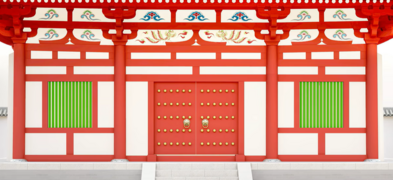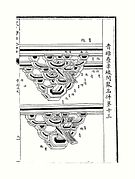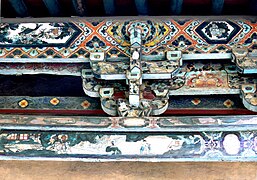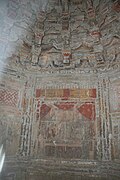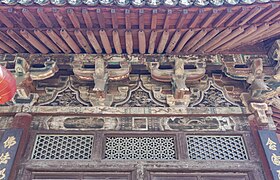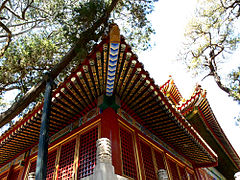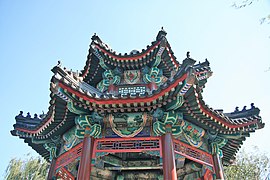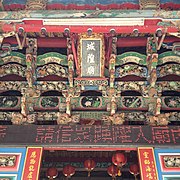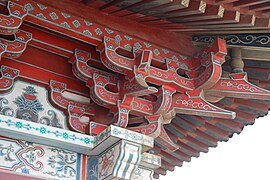Caihua
You can help expand this article with text translated from the corresponding article in Chinese. (January 2022) Click [show] for important translation instructions.
|
| Caihua | |||||||
|---|---|---|---|---|---|---|---|
 Caihua of the Forbidden City | |||||||
| Traditional Chinese | 彩畫 | ||||||
| Simplified Chinese | 彩画 | ||||||
| Literal meaning | "Colour-painting" | ||||||
| |||||||
Caihua (Chinese: 彩畫; pinyin: cǎihuà), or "colour painting", is the traditional Chinese decorative painting or polychrome used for architecture and one of the most notable and important features of historical Chinese architecture. It held a significant artistic and practical role within the development of East-Asian architecture, as Caihua served not only decoration but also protection of the predominantly wooden architecture from various seasonal elements and hid the imperfections of the wood itself. The use of different colours or paintings would be according to the particular building functions and local regional customs, as well as historical periods. The choice of colours and symbology are based on traditional Chinese philosophies of the Five Elements and other ritualistic principles. [1][2] The Caihua is often separated into three layer structures; timber or lacquer layer, plaster layer, and pigment layer.[citation needed]
History[edit]
This section needs expansion. You can help by adding to it. (January 2022) |
The origins of Caihua can be traced back to the Zhou dynasty,[3][4] as the Zuo Zhuan and Guliang Zhuan detailed:
“秋,丹桓宮楹。禮,天子、諸侯黝堊,大夫倉,士黈,丹楹,非禮也。[5] (the duke painted red the pillars of [duke] Huan's temple. According to rule, King and royalty use dark and white, gentry use white, yeoman use yellow. Red pillars are against etiquette.)
. The Rites of Zhou similarly records a ritualistic usage of motifs and colour, based on each respective aspects' corresponding symbolic value.
"画缋之事:杂五色。东方谓之青,南方谓之赤,西方谓之白,北方谓之黑,天谓之玄,地谓之黄。青与白相次也,赤与黑相次也,玄与黄相次也。 青与赤谓之文,赤与白谓之章,白与黑谓之黼,黑与青谓之黻,五采备谓之绣。土以黄,其象方,天时变;火以圜,山以章,水以龙;鸟,兽,蛇。杂四时五色之位以章之,谓之巧。凡画缋之事,后素功"[6]
Gallery[edit]
-
Painted elements can be seen on Han dynasty pottery tower.
-
Painted elements can be seen on Han dynasty pottery tower.
-
Example of Tang dynasty decorative motifs, from mural of Mogao Caves.
-
Example of Tang dynasty decorative motifs on architecture, from mural of Mogao Caves.
-
Recreation of Tang dynasty caihua architectural decorations.
-
Recreation of Tang dynasty caihua architectural decorations.
-
Tang dynasty sancai model of a building.
-
Song Dynasty "Wucai Caihua" (Five Coloured Painting)-dougong decorations guide as detailed on the Yingzao Fashi
-
Song Dynasty "Danfen Caihua" (Red and White)-dougong decorations guide as detailed on the Yingzao Fashi.
-
Song Dynasty "Qinglü" (Blue and Green)-decorations guide as detailed on the Yingzao Fashi.
-
Song Dynasty "Jielü Caihua" (Open Green)-decorations guide as detailed on the Yingzao Fashi.
-
Song Dynasty ruyi-decorations on beams guide from the Yingzao Fashi.
-
Song Dynasty ruyi-decorations on beams guide from the Yingzao Fashi.
-
Song Dynasty pillar decorations guide from the Yingzao Fashi.
-
Song Dynasty decorations used in between dougong-brackets guide from the Yingzao Fashi.
-
Buddhist decorations of Ten-Thousand Buddha Hall of Zhenguo Temple, Five Dynasties period.
-
Decorations on Liao dynasty Geyuan Temple.
-
Caihua found on Jinci temple, Song Dynasty.
-
Frescos of Song Silang's Tomb, Northern Song Dynasty.
-
Frescos of Song Silang's Tomb, Northern Song Dynasty.
-
Weathered decorations on Yuanmiao Temple (Putian) dougong. Originally Song dynasty construction.
-
Jin dynasty Jingtu Temple of Shanxi.
-
Datong Confucian temple inner hall decorations.
-
Ming dynasty decorations on Hall of Amitābha at Longxing Temple.
-
Ming dynasty decorations on Jialan Hall at Foguang Temple.
-
Ming dynasty decorations on Hall of Amitābha at Longxing Temple.
-
Ming dynasty decorations on Hall of Amitābha at Longxing Temple.
-
Xuanzi-style decorative design on the Beijing Dongyue Temple
-
Caihua found on the Gate of Heavenly Purity of the Forbidden City
-
Hexi-style decorative design on the Imperial Palace gate of the Forbidden City
-
Underside decorations of Qin'an Hall of the Forbidden City
-
Decorations on support beams inside a palace of the Forbidden City.
-
Datong Guandi temple.
-
Decorations on Summer Palace pavilion
-
Magong Chenghuang Temple decorations, Taiwan.
-
Painted mural depicting an event from Journey to the West on the Long Corridor from Qing Dynasty Summer Palace
-
Caihua-decorations of Pavilion of Prince Teng, inspired by Song dynasty Yingzao Fashi decorations.
-
Caihua-decorations of Pavilion of Prince Teng, inspired by Song dynasty Yingzao Fashi decorations.
-
Caihua-decorations of Pavilion of Prince Teng, inspired by Song dynasty Yingzao Fashi decorations.
See also[edit]
- Hexi Caihua
- Ancient Chinese wooden architecture
- Chinese architecture
- Yingzao Fashi
- Architecture of the Song Dynasty
- Dancheong
References[edit]
- ^ 孙大章 (1991). 中国古代建筑彩画 [Ancient Chinese Architectural Colored Drawings] (in Chinese). 建筑工业出版社. ISBN 7-112-07328-6.
- ^ 赵双成 (2006). 中国建筑彩画图案 [Chinese architecture painting design] (in Chinese). 天津大学出版社. ISBN 978-7561822494.
- ^ 刘敦桢 (Liu Dunzhen) (1991). 中国古代建筑史 [History of Chinese Ancient Architecture] (2 ed.). 中国建筑工业出版社; 第2版 (China Architecture Building Press). ISBN 9787112019298.
- ^ Flags, color, and the legal narrative : public memory, identity, and critique. Anne Wagner, Sarah Marusek. Cham, Switzerland: Springer. 2021. p. 129. ISBN 978-3-030-32865-8. OCLC 1253353500.
{{cite book}}: CS1 maint: others (link) - ^ 穀梁子. . Vol. 莊公, 二十三年 – via Wikisource.
- ^ . Vol. 6, 冬官考工记 – via Wikisource.





